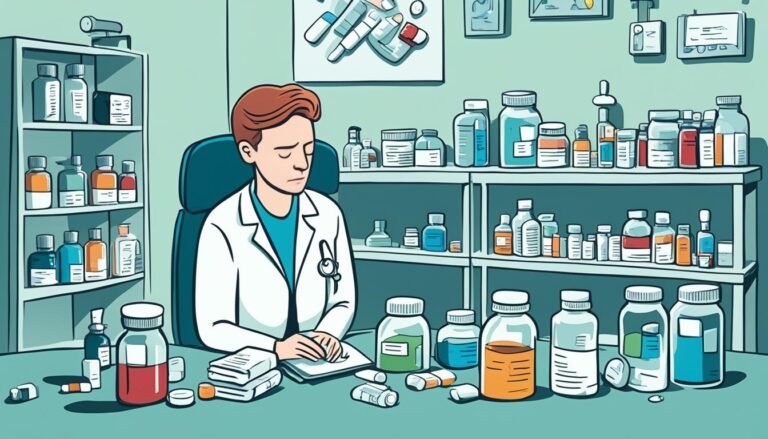Understanding Patient Rights and Responsibilities
As people, we all have both rights and duties that affect how we engage with our surroundings. But, have you thought about what rights and duties you hold as a patient in the healthcare world? Many of us don’t know the rights we have or the roles we must fulfill. In this piece, we will dive into the key matter of patient rights and responsibilities. We aim to show what it takes to be an informed and engaged patient in healthcare today.
Every patient has the right to be treated with respect and make choices based on complete information. This is balanced by the need to share correct health details and act respectfully towards others. These principles are at the core of patient-focused care. This article is for healthcare workers, patients, and anyone wanting to understand patient care better. It offers insights into this essential but often unexplored part of the healthcare journey.
Let’s start exploring the rights and duties that define the relationship between patient and provider. We will challenge usual thoughts and help patients play an active part in their health journey.
Key Takeaways:
- Patient rights include getting respectful, skilled care, accessing medical records, and taking part in care plans.
- Confidentiality and privacy are critical patient rights that need to be protected.
- Patients are free to turn down treatment and seek other opinions if they wish.
- Healthcare facilities should ensure everyone can access care and prevent discrimination.
- Any patient complaints or issues should be handled quickly and fully.
Patient Confidentiality and Privacy
Keeping patient info private is critical in healthcare. Everyone deserves to keep their health details and records safe. They should trust that only necessary people will see them. This helps keep their personal life and choices respected.
Doctors must keep your secrets. This trust is vital for a strong relationship with your health team. When patients know their info is safe, they are more likely to share what matters most.
Being able to see their records helps patients understand their health and care. It lets them know what’s happening and be part of their treatment. This is key for making informed decisions.
Patients should always choose who can see their health info. This means info about their past, conditions, and treatments. Protecting this choice is part of keeping them safe and in control of their health journey.
“Respecting patient confidentiality and privacy is not only an ethical responsibility but also a legal requirement. It forms the foundation of patient-centered care and helps build trusting relationships between patients and healthcare providers.”
Importance of Patient Confidentiality and Privacy
There are many reasons why keeping patient info confidential is important:
- It stops personal info, like medical conditions, from being misused or causing harm.
- It makes patients more likely to share honestly, which leads to better care.
- It helps patients freely choose their care options, without worrying about judgment.
| Benefits of Patient Confidentiality and Privacy | Challenges |
|---|---|
| 1. Protection of personal information | 1. Maintaining information security |
| 2. Patient trust and satisfaction | 2. Balancing access to information for care coordination |
| 3. Respect for patient autonomy | 3. Addressing data breaches and cybersecurity threats |
Informed Consent and Medical Treatment
Understanding your medical treatment is your right. You need to know about your sickness, what to expect, and your choices. This lets you make decisions that fit with what you believe and want. Doctors and nurses must explain everything in a way you can easily understand.
You can say yes or no to any treatment. This means you get to pick what you think is best for you. It’s important that your healthcare team supports your choices, even if they have a different opinion.
If someone is too sick to make choices, a trusted person can decide for them. This makes sure that the patient’s needs and wants are always considered and respected.
Facilitating Patient Decision-Making
Your healthcare team helps you make choices. They will talk about what could happen and what might help you the most. This helps you think and decide what’s best based on your goals and what you care about.
They might also use written stuff and pictures to help you understand better. They could give you brochures, fact sheets, or videos. This way, you can learn more about your health even when you’re not at the doctor’s office.
“Informed consent is not just about getting a signature on a piece of paper; it is a process of engagement and mutual respect between patients and healthcare providers.”
Sample Treatment Options
Here are some examples to show you how important informed consent is. Let’s look at different treatment options and what each choice might mean for you:
| Treatment Option | Benefits | Risks | Alternative |
|---|---|---|---|
| Medication | Effective in managing symptoms | Potential side effects and interactions | Alternative therapies, lifestyle changes |
| Surgery | Potential for cure or improved quality of life | Risks of complications, infection, and anesthesia | Watchful waiting, non-surgical interventions |
| Physical Therapy | Promotes healing and rehabilitation | Possible temporary discomfort | Modalities, home exercises |
Every patient is different. Doctors and nurses will help you choose what’s best for you, considering what’s special about your case. Always talk openly with your medical team, ask questions, and clear up any doubts. This way, you can be sure you’re choosing what’s right for your health.
Healthcare Equality and Nondiscrimination
Every patient deserves quality care without facing discrimination. It’s key to offer equal treatment, no matter one’s background. Healthcare places must follow this, ensuring fair access for everyone, even those with less money.
Eliminating differences in healthcare starts with understanding and tackling disparities. Everyone in healthcare should work to stop discrimination. This effort helps in building a fairer healthcare world.
Patients have the right to stand up against unfair treatment. They should feel brave to report any discrimination. Health centers need to give patients ways to voice their concerns. This helps people fight for their rights and keeps healthcare providers in check.
Healthcare also means supporting the spiritual side of patients if they want it. Including pastoral care can bring comfort in tough times. It shows respect for the patient as a whole.
Case Study: Addressing Healthcare Discrimination
“XYZ Medical Center firmly supports ending discrimination in healthcare. We’ve set up a patient advocacy division to listen and respond fast to concerns. Our approach values patient rights, ensuring a kind and fair healthcare experience for all. Together, we aim for exceptional care for every patient.”
By making equality and fairness a top goal, healthcare workers can make a better system. Education and ongoing improvement lead to a healthcare future where everyone gets the right, respectful care.
Patient Complaints and Grievances
Patient complaints and grievances are vital in healthcare. They let people express concerns and find solutions. Healthcare facilities need to handle these issues quickly and well. This ensures patients are happy and improves care quality.
Patients can be unhappy with various health experiences. This includes poor professional behavior, treatment quality, or the facility’s environment. When patients speak up, they help make healthcare better and avoid future problems.
There are steps patients can take to resolve complaints. They can contact the Office of Patient Engagement at the facility where the issue happened. This office’s goal is to help patients and find solutions. Often, a representative will look into the complaint and work with the patient to fix it.
Patients may also choose to file a grievance with oversight bodies like the NC Department of Health and The Joint Commission. These groups ensure healthcare facilities meet standards. By filing a grievance, patients alert them to problems. The groups investigate and take action if needed.
For safety concerns or violations of rights, patients can complain to the U.S. Department of Health and Human Services, Office for Civil Rights. This office upholds patient privacy and federal laws.
In general, patient complaints are key to enhancing healthcare quality and safety. By addressing and resolving these issues, facilities show they care about their patients and are dedicated to getting better.
Key Takeaways:
- Patient complaints and grievances are a crucial part of healthcare, allowing individuals to voice their concerns and seek resolution for issues they encounter.
- Healthcare facilities should promptly address complaints and grievances to improve patient satisfaction and overall care quality.
- Patients can contact the Office of Patient Engagement within the facility, file a grievance with regulatory bodies, or report concerns to the U.S. Department of Health and Human Services if needed.
- Addressing patient concerns demonstrates a commitment to patient-centered care and continuous improvement in healthcare.
Physician Conscience and Ethical Obligations
Physicians are key in healthcare, offering care and advice to people. They have two big areas to focus on—professional duties and ethical do’s and don’ts. The ethical rules aim to keep patient care honest, respectful, and caring.
Physician conscience is vital. It lets doctors follow their beliefs and morals. But, they can’t always do what they want in the name of conscience. They must think hard about how their choices affect their patients.
In emergencies, doctors must act fast and do what’s best for the patient, no matter their own beliefs. They have a duty to help in life or death moments.
It’s also crucial for doctors to respect patients’ choices. If a patient says no to a treatment that could save their life, doctors must listen. They should let the patient’s wishes guide their actions.
As for privacy and consent, doctors must keep patient secrets safe and always get permission before treatment. They should also make sure their patient’s privacy is respected while being treated.
Doctors must always put their patient’s health first. They shouldn’t let their own opinions or other pressures cloud their judgment. This builds trust and makes healthcare work better.
“As physicians, we put our patients’ wellbeing first. Our ethics show us the way, making sure care comes first.” – Dr. Sarah Adams
Physician Conscience and Patient Refusal
Sometimes, patients say no to what the doctor suggests. It’s up to the doctor to talk openly and kindly with them. They should find out why the patient refuses and clear up any confusion.
Patient refusal is part of letting people make their own choices. Doctors need to lay out all the facts, good and bad, so patients know their options. This helps patients make smart decisions.
If a patient turns down a treatment, doctors should look for other ways to help that still match the patient’s values. It’s about finding a solution that keeps the patient safe and well. The doctor might need to team up with other healthcare experts to find the best plan.
Doctors must approach patient refusal with understanding. They should respect the patient’s right to choose. Good talk and decisions made together are key in handling these tough situations. It’s about putting the patient first in care.
| Ethical Obligations | Description |
|---|---|
| Preserving Patient Confidentiality | Respecting and safeguarding patient privacy and maintaining the confidentiality of patient health information. |
| Obtaining Informed Consent | Ensuring patients are fully informed about their treatment options, risks, and benefits, and obtaining their consent before initiating medical interventions. |
| Respecting Patient Privacy | Respecting the boundaries and personal space of patients, maintaining their dignity and modesty during examinations and procedures. |
| Promoting Patient Care | Placing patient well-being at the center of medical practice, providing quality care that is evidence-based and tailored to individual needs. |
| Emphasizing Physician Integrity | Conducting oneself with honesty, transparency, and ethical conduct, ensuring trust and confidence in the medical profession. |
Doctors’ actions make a huge difference in healthcare and people’s lives. By sticking to their ethical duties and keeping their conscience in check, doctors provide kind, patient-focused care. They respect everyone’s rights and values.
Advance Directives and End-of-Life Decisions
When facing end-of-life decisions, people have the right to choose through advance directives. These include living wills and healthcare power of attorney. They let individuals say what medical care they want if they can’t speak for themselves.
Advance directives help patients feel in control of their care. They make sure their choices are followed, even if they can’t say them. Patients can make it clear what treatments they do and don’t want.
Stopping treatment based on a patient’s advance directives is key in end-of-life care. Personal choice is vital. People can say no to any treatment, even if it might end their life. Doctors must respect this, putting the patient’s wishes first.
“Advance directives provide patients with a sense of control and autonomy over their healthcare, ensuring that their wishes are respected, even when they are no longer able to speak for themselves.”
It’s crucial to talk openly about end-of-life wishes with medical staff and loved ones. These talks make sure everyone knows the patient’s choices. It helps healthcare teams plan care that follows these wishes.
Discussing end-of-life and advance directives is tough but necessary. It helps lighten the load on family and healthcare teams. Sharing one’s choices early ensures they’re respected and carried out.
Ethics Committees and Decision Making
Ethics committees are crucial in dealing with ethical issues in patient care. These are teams of experts like doctors, lawyers, and community members. They work together to make sure patients’ rights and ethical rules are followed. Ethics committees support healthcare workers in making ethical decisions and handling tough ethical problems.
Ethical issues are common in patient care, like deciding about end-of-life. Dealing with resources, or keeping patient secrets safe. Ethics committees use their knowledge to think about these issues from many angles. They then set ethical rules for doctors and nurses to follow.
“Ethics committees help healthcare staff, patients, and their families talk about hard, emotional choice.”
Ethics consultation is a major help from these committees. When doctors or nurses face a tough ethical situation, they can ask the ethics committee for advice. The committee’s advice ensures that decisions respect everyone’s values and concerns.
Benefits of Ethics Committees
Having ethics committees in hospitals has many good sides:
- They help patients make choices based on their own values.
- They encourage different experts to work together.
- They guide how to make ethical decisions.
- They offer ways for more learning and training.
By helping in ethical decisions, ethics committees improve patient-centered care. This leads to better patient results.
Case Study: Ethical Dilemma in Patient Care
Imagine this situation:
Dr. Patel cares for a patient with a long-term illness. The patient is not doing well. Dr. Patel thinks a new treatment could help a lot. But, it’s very costly, and the patient’s insurance won’t pay. Dr. Patel is stuck between helping the patient a lot or avoiding the high cost for them.
Dr. Patel can turn to the ethics committee for advice. The committee can guide him on balancing the patient’s wishes, fairness, and the goal of care. This way, by working with the ethics committee, Dr. Patel can choose what’s best for the patient with ethics in mind.
Patient Safety and Participation
Patient safety is crucial in healthcare. Everyone deserves care in a safe place that boosts health and lowers harm risks. It’s the duty of healthcare workers to follow safety rules and protect the people they care for.
Having patients actively involved makes the setting safer. They should take part in their care, share any worries, and help make choices about their health. This makes them key players in their health journey, aiming for the best results together with the medical team.
“Patient involvement is a key part of safety and quality improvement. When patients join in, they feel stronger and help find and stop risks and errors.” — Dr. Jane Anderson, Director of Patient Safety at XYZ Medical Center
When patients join in, safety improves a lot. They’re more likely to take their meds right, notice and tell about bad reactions, and help stop infections. This team effort is crucial for avoiding mistakes, cutting down on hospital infections, and keeping patients safe.
To keep patients safe and engaged, hospitals must share lots of info about pain, infections, and safety. They should talk about risks and how patients can help lower them. Giving patients this knowledge means they can make smart choices, boosting health outcomes and safety.
Patient Safety Checklist
Use the following checklist to ensure patient safety and promote active participation:
- Ask questions about your care and treatment plan.
- Communicate any concerns or changes in your condition to your healthcare provider.
- Follow medication and treatment instructions as prescribed.
- Ensure proper hand hygiene and infection control practices.
- Participate in discussions about pain management options.
- Report any potential safety hazards or incidents.
- Seek clarification on any medical procedures or tests before giving consent.
Being active in your care and keeping informed helps keep you safe and boosts the care’s quality.
| Benefits of Patient Safety and Participation | Actions to Promote Patient Safety |
|---|---|
| Reduces the risk of medical errors | Implement standardized safety protocols and procedures |
| Improves adherence to medication and treatment regimens | Provide comprehensive patient education on treatment plans and potential side effects |
| Enhances infection control practices | Promote proper hand hygiene and implement infection prevention measures |
| Fosters a culture of open communication | Encourage patients to voice concerns and actively participate in care decisions |
Both patient safety and involvement are vital. Prioritizing safety, taking proactive steps, and engaging patients actively helps provide the best healthcare and outcomes.
Conclusion
Knowing patient rights and what they must do is key to making healthcare about the patient. Everyone has the right to kind, top-notch care. This lets them choose wisely about their health. Keeping personal info and health records private is very important, too.
But, patients also have duties. They must share the truth about their health. And, follow what the doctor advises. Treat both the medical staff and other patients with kindness and respect. This helps you in your own health journey. Plus, it makes the healthcare place better for everyone.
Hospitals and clinics must also do their part. They must make sure everyone can get medical help, no matter who they are or what they have. Creating a space that cares deeply about patients can lift their happiness and health. It makes healthcare a great place for all.
FAQ
What are patient rights?
What are patient responsibilities?
What is patient confidentiality?
What is informed consent?
What should I do if I have a complaint or concern about my care?
What are physician’s ethical obligations?
What are advance directives?
What is the role of ethics committees in patient care?
What is patient safety?
Why is understanding patient rights and responsibilities important?
Source Links
- https://code-medical-ethics.ama-assn.org/ethics-opinions/patient-rights
- https://www.mayoclinic.org/documents/mcj6256-pdf/doc-20079310
- https://www.nashunchealthcare.org/patients-visitors/patient-rights-and-responsibilities/

Our Healthcare Editorial Team is composed of subject matter experts and seasoned healthcare consultants who bring decades of combined experience and a wealth of academic qualifications. With advanced degrees and certifications in various medical and healthcare management fields, they are dedicated to supporting the personal and career development of healthcare professionals. Their expertise spans clinical practice, healthcare policy, patient advocacy, and public health, allowing us to offer insightful, well-researched content that enhances professional growth and informs practice.
Disclaimer
The client education section of our blog is intended to support healthcare providers by offering informational resources for patient education. However, this information is not meant to serve as medical advice. We advise healthcare professionals to ensure all content is consistent with their clinical knowledge and confirm with current medical standards before using it in their practice or advising patients. For specific medical issues, always refer to professional guidance and standards of care.
For any legal matters or specific medical concerns, we strongly recommend consulting with a qualified legal professional or referring to government websites for authoritative information.







